#Bartolomeo Vanzetti
Explore tagged Tumblr posts
Text
Los anarquistas creemos en un mundo sin fronteras. Yo creo en la anarquía. Anarquía significa libertad. Abolición de la sociedad dividida en clases, respeto general. Para mí, esas son las cosas que importan en la vida. Intento vivir mi vida siguiendo estos ideales.
Bartolomeo Vanzetti
3 notes
·
View notes
Text
Was just minding my business listening to assorted Wes Anderson soundtracks, now I’m crying bc of Joan Baez’s beautiful song for Sacco and Vanzetti:
Here’s to you, Nicola and Bart
Rest forever here in our hearts
The last and final moment is yours
That agony is your triumph.
For more on the tragedy of Nicola Sacco and Bartolomeo Vanzetti:
#joan baez#Sacco and Vanzetti#Nicola Sacco#Bartolomeo Vanzetti#here’s to you Nicola and Bart#weeping#communism#socialism#red scare#20th century#1920s#protest music#anarchist#Spotify
9 notes
·
View notes
Text
Sacco & Vanzetti
Bartolomeo Vanzetti – Ιστορία μιας προλεταριακής ζωής Η ιστορία μου δεν αξιώνει ολόκληρη αυτοβιογραφία. Ανώνυμος σ’ ένα πλήθος ανωνύμων, μου έλαχε να ελκύσω και να καθρεφτίσω λίγο από το φως της δυναμικής σκέψης που οδηγεί την ανθρωπότητα σε καλύτερη μοίρα. Γεννήθηκα στις 11 Ιουνίου 1888 από τον Tζιοβάνι Mπατί-στα Bαντσέτι και την Tζοβάνα Bαντσέτι στο Bιλαφαλέτο, στην επαρχία του Kούνεο στο…

View On WordPress
0 notes
Text
Sacco & Vanzetti
Bartolomeo Vanzetti – Ιστορία μιας προλεταριακής ζωής Η ιστορία μου δεν αξιώνει ολόκληρη αυτοβιογραφία. Ανώνυμος σ’ ένα πλήθος ανωνύμων, μου έλαχε να ελκύσω και να καθρεφτίσω λίγο από το φως της δυναμικής σκέψης που οδηγεί την ανθρωπότητα σε καλύτερη μοίρα. Γεννήθηκα στις 11 Ιουνίου 1888 από τον Tζιοβάνι Mπατί-στα Bαντσέτι και την Tζοβάνα Bαντσέτι στο Bιλαφαλέτο, στην επαρχία του Kούνεο στο…

View On WordPress
0 notes
Text
De peperbus van nonkel Miele (61): Trump en fascisme
In november e.k. zijn er verkiezingen in de VS. Sommigen zien in de kansen van Donald Trump het gevaar van fascisme in de Verenigde Staten. Een bloedige dictatuur is misschien overdreven. Maar sommige fascistische ingrediënten zijn wel aanwezig in de VS. Tegelijk hebben de VS een ander gezicht: de sociale, ecologische en anti-raciale strijd. Ook is een socialistisch geïnspireerd senator en…
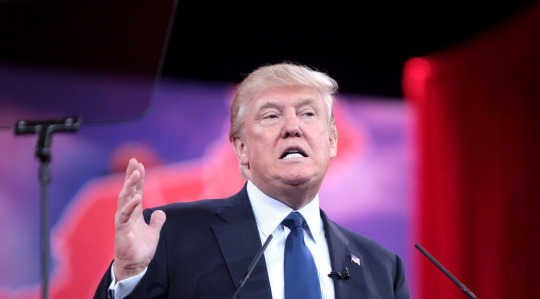
View On WordPress
#Angela Davis#bartolomeo vanzetti#Bernie Sanders#Celestino Medeiros#Donald Trump#Emmett Till#Fran Drescher#Gabriel Rockhill#George Floyd#Jesse Washington#Joe Biden#Joe McCarthy#Malcolm X#Martin Luther King#Nicola Sacco#Wernher Von Braun
1 note
·
View note
Text
i love you italian characters that arent associated with the mafia i love you italian characters who arent gangsters i love you female italian characters who arent housewives i love you male italian characters who arent violent i love you italian characters with realistic accents
#did you know that in the early 2000s there were a couple polls conducted#and they found that 78% of teens and 74% of adults think the majority of italian americans are associated with organized crime#did you know that the actual stat for italian americans associated with organized crime is around 1 in 6000#did you know that hundreds of italian immigrants were arrested for organized crime association with no proof#did you know that teddy roosevelt said the lynching of 11 italian immigrants was “a rather good thing”#do you know who nicola sacco and bartolomeo vanzetti are#idk maybe im dramatic#but its really weird when the majority of peoples first thought when they think about italians is like 10 different mafia movies#or just i cooka da meatball#which is funny when its not the only thing said to you ever upon finding out youre italian#anyways thats just about italian-americans wait til yall hear about what other countries are on#italian
33 notes
·
View notes
Text
i know it's bad form to laugh at your own jokes but i do think it's really funny to imagine swedish-american labor activist Joe Hill, writer of songs such as There is Power in a Union or The Tramp, who was very famously killed in 1915, is actually still alive and just fucking around on tumblr.
#i mean he did say it takes more than guns to kill a man and that he never died#not worm#imagine you get a follow notification on tumblr and it was fucking Bartolomeo Vanzetti#semi obscure american hypercapitalist history
6 notes
·
View notes
Text
"Free the Prisoners"
Train graffiti in Vienna for the Week of Solidarity with Anarchist Prisoners.
Every year since 2013, the International Solidarity Week for Anarchist Prisoners has taken place from August 23 - 30. We have chosen August 23rd as the beginning because on this day in 1927, the Italian-American anarchists Nicola Sacco and Bartolomeo Vanzetti were executed in prison. Convicted on suspicion of murdering two men during an armed robbery at a shoe factory in Massachusetts. Their arrest was part of a campaign waged by the American government against anarchists. There was no evidence from the state and so the two were executed for their strong anarchist beliefs.
We call on everyone to organize actions in solidarity with anarchist prisoners.
Do what you think is necessary.
Until all are free.
- Text by Anarchist Black Cross Vienna -
105 notes
·
View notes
Text
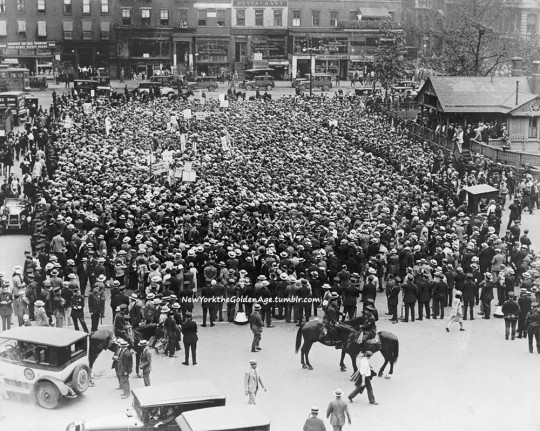
Nicola Sacco and Bartolomeo Vanzetti died in the electric chair on August 23, 1927. They were accused of killing two men during an armed robbery.
The trial and subsequent appeals attracted enormous interest internationally, and generated vehement protests. Sacco and Vanzetti were considered to be victims of prejudice against immigrants, Italians, Catholics, and anarchists. John Dos Passos, Dorothy Parker, Edna St. Vincent Millay, George Bernard Shaw, and Albert Einstein were among those who wrote about the case or signed petitions.
The photo above shows a demonstration in Union Square on the day of the men's execution.
Photo: Everett via Fine Art America
#vintage New York#1920s#Sacco & Vanzetti#protest#demonstration#cause celebre#August 23#23 August#23 Aug.#Aug. 23#Union Square#political protest#anarchism
185 notes
·
View notes
Text
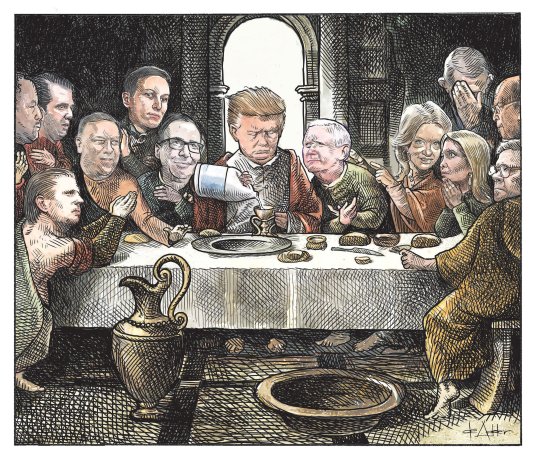
The Chronicle Herald :: Michael de Adder :: @deAdder
* * * *
LETTERS FROM AN AMERICAN
July 28, 2024
Heather Cox Richardson
Jul 29, 2024
Just a week ago, it seems, a new America began. I’ve struggled ever since to figure out what the apparent sudden revolution in our politics means.
I keep coming back to the Ernest Hemingway quote about how bankruptcy happens. He said it happens in two stages, first gradually and then suddenly.
That’s how scholars say fascism happens, too—first slowly and then all at once—and that’s what has been keeping us up at night.
But the more I think about it, the more I think maybe democracy happens the same way, too: slowly, and then all at once.
At this country’s most important revolutionary moments, it has seemed as if the country turned on a dime.
In 1763, just after the end of the French and Indian War, American colonists loved that they were part of the British empire. And yet, by 1776, just a little more than a decade later, they had declared independence from that empire and set down the principles that everyone has a right to be treated equally before the law and to have a say in their government.
The change was just as quick in the 1850s. In 1853 it sure looked as if the elite southern enslavers had taken over the country. They controlled the Senate, the White House, and the Supreme Court. They explicitly rejected the Declaration of Independence and declared that they had the right to rule over the country’s majority. They planned to take over the United States and then to take over the world, creating a global economy based on human enslavement.
And yet, just seven years later, voters put Abraham Lincoln in the White House with a promise to stand against the Slave Power and to protect a government “of the people, by the people, and for the people.” He ushered in “a new birth of freedom” in what historians call the second American revolution.
The same pattern was true in the 1920s, when it seemed as if business interests and government were so deeply entwined that it was only a question of time until the United States went down the same dark path to fascism that so many other nations did in that era. In 1927, after the execution of immigrant anarchists Nicola Sacco and Bartolomeo Vanzetti, poet John Dos Passos wrote: “they have clubbed us off the streets they are stronger they are rich they hire and fire the politicians the newspaper editors the old judges the small men with reputations….”
And yet, just five years later, voters elected Franklin Delano Roosevelt, who promised Americans a New Deal and ushered in a country that regulated business, provided a basic social safety net, promoted infrastructure, and protected civil rights.
Every time we expand democracy, it seems we get complacent, thinking it’s a done deal. We forget that democracy is a process and that it’s never finished.
And when we get complacent, people who want power use our system to take over the government. They get control of the Senate, the White House, and the Supreme Court, and they begin to undermine the principle that we should be treated equally before the law and to chip away at the idea that we have a right to a say in our government. And it starts to seem like we have lost our democracy.
But all the while, there are people who keep the faith. Lawmakers, of course, but also teachers and journalists and the musicians who push back against the fear by reminding us of love and family and community. And in those communities, people begin to organize—the marginalized people who are the first to feel the bite of reaction, and grassroots groups. They keep the embers of democracy alive.
And then something fans them into flame.
In the 1760s it was the Stamp Act, which said that men in Great Britain had the right to rule over men in the American colonies. In the 1850s it was the Kansas-Nebraska Act, which gave the elite enslavers the power to rule the United States. And in 1929 it was the Great Crash, which proved that the businessmen had no idea what they were doing and had no plan for getting the country out of the Great Depression.
The last several decades have felt like we were fighting a holding action, trying to protect democracy first from an oligarchy and then from a dictator. Many Americans saw their rights being stripped away…even as they were quietly becoming stronger.
That strength showed in the Women’s March of January 2017, and it continued to grow—quietly under Donald Trump and more openly under the protections of the Biden administration. People began to organize in school boards and state legislatures and Congress. They also began to organize over TikTok and Instagram and Facebook and newsletters and Zoom calls.
And then something set them ablaze. The 2022 Dobbs v. Jackson Women’s Health Organization decision stripped away from the American people a constitutional right they had enjoyed for almost fifty years, and made it clear that a small minority intended to destroy democracy and replace it with a dictatorship based in Christian nationalism.
When President Joe Biden announced just a week ago that he would not accept the Democratic nomination for president, he did not pass the torch to Vice President Kamala Harris.
He passed it to us.
It is up to us to decide whether we want a country based on fear or on facts, on reaction or on reality, on hatred or on hope.
It is up to us whether it will be fascism or democracy that, in the end, moves swiftly, and up to us whether we will choose to follow in the footsteps of those Americans who came before us in our noblest moments, and launch a brand new era in American history.
LETTERS FROM AN AMERICAN
HEATHER COX RICHARDSON
#last supper#about art#Michael de Adder#political cartoon#Letters From An American#Heather Cox Richardson#American political history#politics#anti-authoritarianism#anti-democratic#election 2024
33 notes
·
View notes
Text
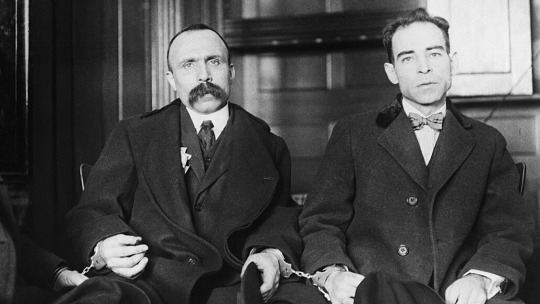
Today, it has been 96 years since the execution of the anarchists Nicola Sacco and Bartolomeo Vanzetti. Anti-immigrant bigotry played a significant part in determining the outcome of their trial. The court case became a rallying point for thousands around the world.
"Not only am I innocent of these two crimes, not only in all my life I have never stolen, never killed, never spilled blood, but I have struggled all my life, since I began to reason, to eliminate crime from the earth...
"I am suffering because I am a radical and indeed I am a radical; I have suffered because I was an Italian, and indeed I am an Italian; I have suffered more for my family and for my beloved than for myself; but I am so convinced to be right that you can only kill me once but if you could execute me two times, and if I could be reborn two other times, I would live again to do what I have done already."
-Bartolomeo Vanzetti, addressing the court at their sentencing
185 notes
·
View notes
Text
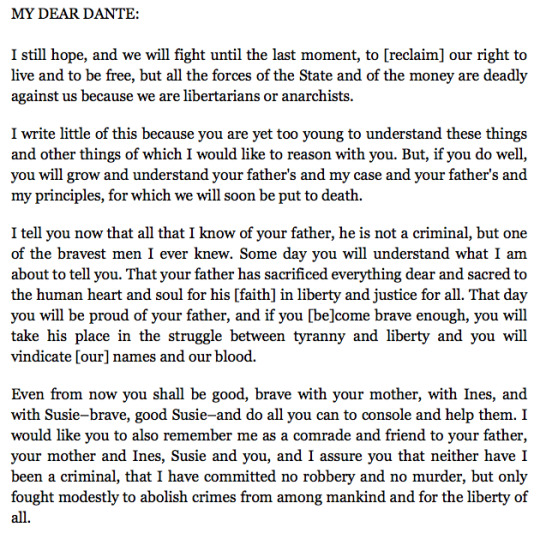
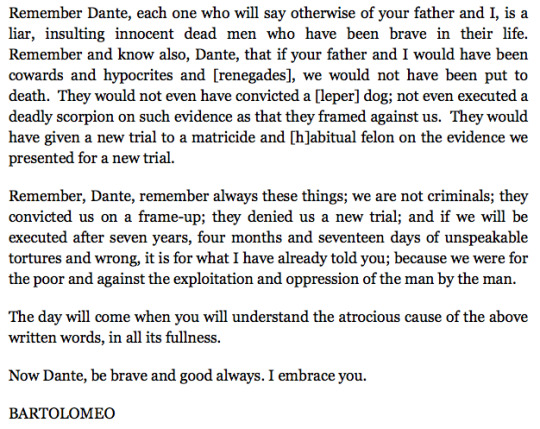
Bartolomeo Vanzetti's letter to Nicola Sacco's son, Dante. Written from the Death House of Massachusetts State Prison; August 21, 1927 – two days prior to Sacco and Vanzetti's execution by electric chair, on August 23, 1927.
(I.D. under the cut)
[MY DEAR DANTE:
I still hope, and we will fight until the last moment, to [reclaim] our right to live and to be free, but all the forces of the State and of the money are deadly against us because we are libertarians or anarchists.
I write little of this because you are yet too young to understand these things and other things of which I would like to reason with you. But, if you do well, you will grow and understand your father's and my case and your father's and my principles, for which we will soon be put to death.
I tell you now that all that I know of your father, he is not a criminal, but one of the bravest men I ever knew. Some day you will understand what I am about to tell you. That your father has sacrificed everything dear and sacred to the human heart and soul for his [faith] in liberty and justice for all. That day you will be proud of your father, and if you [be]come brave enough, you will take his place in the struggle between tyranny and liberty and you will vindicate [our] names and our blood.
Even from now you shall be good, brave with your mother, with Ines, and with Susie–brave, good Susie–and do all you can to console and help them. I would like you to also remember me as a comrade and friend to your father, your mother and Ines, Susie and you, and I assure you that neither have I been a criminal, that I have committed no robbery and no murder, but only fought modestly to abolish crimes from among mankind and for the liberty of all.
Remember Dante, each one who will say otherwise of your father and I, is a liar, insulting innocent dead men who have been brave in their life. Remember and know also, Dante, that if your father and I would have been cowards and hypocrites and [renegades], we would not have been put to death. They would not even have convicted a [leper] dog; not even executed a deadly scorpion on such evidence as that they framed against us. They would have given a new trial to a matricide and [h]abitual felon on the evidence we presented for a new trial.
Remember, Dante, remember always these things; we are not criminals; they convicted us on a frame-up; they denied us a new trial; and if we will be executed after seven years, four months and seventeen days of unspeakable tortures and wrong, it is for what I have already told you; because we were for the poor and against the exploitation and oppression of the man by the man.
The day will come when you will understand the atrocious cause of the above written words, in all its fullness.
Now Dante, be brave and good always. I embrace you.
BARTOLOMEO]
73 notes
·
View notes
Text
Gagged at Gustavo Petro’s favorite Americans being Noam Chomsky, Nicola Sacco, Bartolomeo Vanzetti, and Paul Simon
10 notes
·
View notes
Text
given that even Benito Mussolini himself tried to pressure the US government to release Nicola Sacco and Bartolomeo Vanzetti, two Italian-American immigrants who were controversially accused of murder and later executed, given recent events Giorgia Meloni has the opportunity to do something really funny
17 notes
·
View notes
Text
23 agosto 1927: Sacco e Vanzetti giustiziati da innocenti in America
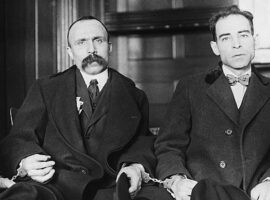
Il 23 agosto del 1927 Nicola Sacco e Bartolomeo Vanzetti furono fatti sedere sulla sedia elettrica e giustiziati per un duplice omicidio che non avevano commesso. I due italiani aderivano al movimento anarchico e sostenevano le battaglie operaie, solo dopo 50 anni fu ristabilita la verità
Il 23 agosto del 1927 la sedia elettrica poneva fine alle vite di questi emigrati italiani, un ciabattino e un pescivendolo, ingiustamente accusati di un duplice omicidio durante una rapina in un calzaturificio.
La loro tragica vicenda ha inizio nel 1920, durante una manifestazione operaia, i due venivano fermati in possesso di pistole e degli appunti. Sacco e Vanzetti per le loro idee anarchiche, il loro status di emigrati appartenenti al movimento operaio, erano i perfetti “agnelli sacrificali” da immolare sull’altare della giustizia americana del tempo.
Inoltre con il loro arresto veniva lanciato un monito ai movimenti popolari dell’epoca, considerati un pericolo per la stabilità degli U.S.A. A nulla valse la confessione del gangster Celestino Madeiros che scagionava Sacco e Vanzetti, così come non contribuì alla loro scarcerazione la mobilitazione popolare a loro favore. Con un processo fazioso (il giudice più volte li definì bastardi), portato avanti con metodologie gravemente erronee e ingiuste, il foggiano e il cuneese, venivano condannati alla pena capitale.
Solo nel 1977 il Governatore del Massachussetts, Michael Kukakis, ammetteva l’errore giudiziario commesso cinquantanni prima, quando venivano uccisi nella giornata d’estate del 23 Agosto del 1927 due innocenti: Nicola Sacco e Bartolomeo Vanzetti
84 notes
·
View notes
Text
Lola Ridge
Poet and activist Lola Ridge was born in 1873 in Dublin, Ireland. Ridge championed the working class, and her poetry dealt with subjects such as labor, immigrants, sex, and the death penalty. She first got the attention of critics in 1918, when her poem "The Ghetto" was published in The New Republic. Ridge published her first book of poetry, The Ghetto and Other Poems, later that year. Many of the poems in the collection explored the lives of Jewish immigrants living in the ghettos of New York City. She went on to publish several more poetry collections, including Red Flags, Sun-up, and Other Poems, and Firehead. In 1927, Ridge was arrested while protesting the executions of Nicola Sacco and Bartolomeo Vanzetti. She was a highly acclaimed poet in her day, winning two Shelley Memorial Awards and a Poetry Magazine Guarantor's Prize.
Lola Ridge died in 1941 at the age of 67.
7 notes
·
View notes